news from the office of international education
Today: "Fighting for migrants' rights," Marquette Democracy Project
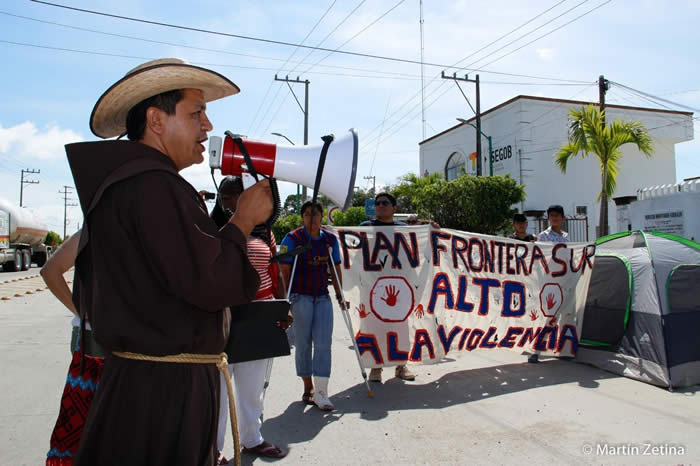 |
Fray Tomás González Castillo, a migrant rights activist, will speak today from 4 p.m. - 5:30 p.m. in AMU room 163. |
Fray Tomás will discuss the journeys of Central American migrants, the dangers presented by U.S. and Mexican border policies, and his fight to protect them as they travel north.
Friar Tomás González Castillo is among the most vocal members of a Catholic movement to advocate for migrants in Mexico. He is founder and director of “La 72,” a sanctuary near the Guatemalan border established as part of a Catholic underground railroad to protect migrants on their journey. Fray Tomás spends much of his time traveling Mexico to call attention to the failures of the Mexican government and U.S. immigration policy, in addition to denouncing drug cartels and investigating disappearances. Based on his provocative public statements, Fray Tomás faces regular death threats. In 2013, he won the Franco-German award for human rights.
RSVP at migrant-rights.eventbrite.com. Part of the Marquette Democracy Project Lecture Series.
2017 Timothy J. Rutenber award presented to OIE Director Terence Miller
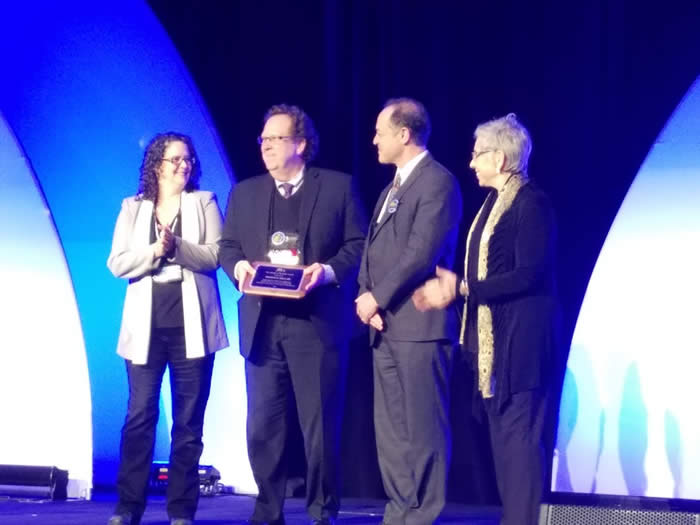 |
The Association of International Education Administrators recognizes Terence's outstanding service to the association. |
Marquette's Office of International Education Director Terence Miller has been presented with the 2017 Timothy J. Rutenber Award!
This award is given each year by the Association of International Education Administrators (AIEA) in recognition of outstanding service to the Association. To be eligible, nominees must be current AIEA members and have been actively involved in AIEA for more than five years.
For more information on the award, visit AIEA's website.
International Day celebrated the cultures of Marquette
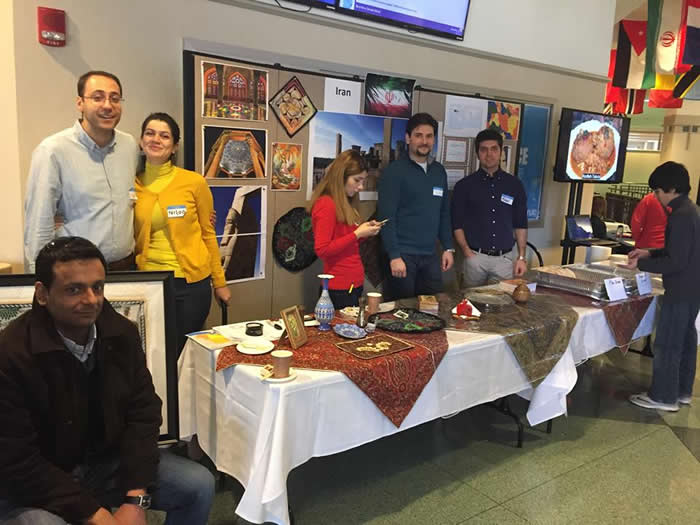 |
On Friday, February 17, 2017 Marquette students and faculty came together to dedicate a day to “Solidarity Through Celebration.” |
Marquette students, faculty and staff attended this year's event to support all of the different cultures that make up Marquette. This year's event aimed to show support to all Marquette international students, especially those impacted by the recent executive order. International and returning study abroad students represented more than 20 countries, including Iran, Egypt, Thailand and Norway. The AMU was filled with traditions, cultures and languages from all around the world. Attendees indulged in rooibos tea from South Africa, traditional Iranian music and food from Iran, Baci candies from Italy and much more. Provost Dan Myers made remarks and told students, “We are Marquette and all are welcome here."
To view photos from the event, visit our Facebook page.
The first Marquette students get the Cuban experience
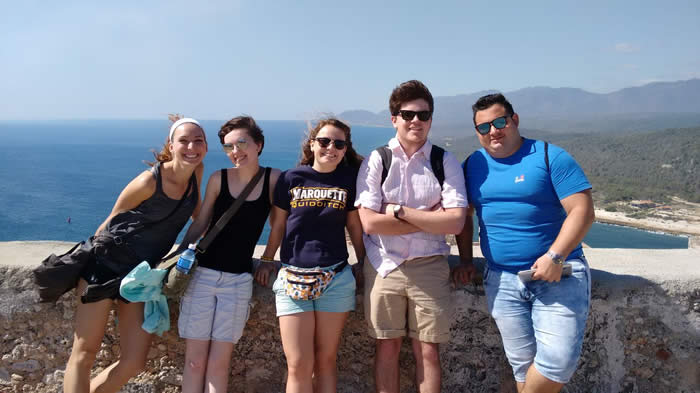 |
Marquette students traveled to Cuba on a new January-term program. |
On January 2 at 8 p.m. Marquette professors Dr. Michael Donoghue and Dr. Laura Matthew sat down for dinner with 15 Marquette students at the Hotel Nacional in Havana, Cuba overlooking the Caribbean Sea. The group was there on an 11-day, faculty-led study abroad program to learn about Cuban history and contemporary developments in U.S. and Cuban relations.
After 65 years of hostility with the United States, Cuba is finally open to U.S. citizens—but not just to any citizen for any reason. The trip’s purpose must fall within one of 12 categories, one being an academic program. Marquette took advantage of this cultural opportunity by offering a J-term program that brought students to Havana and Santiago de Cuba to examine the complex history and unique culture that makes Cuba so fascinating to study.
The course, HIST 4951, was led by Dr. Donoghue, an associate professor in the Department of History. Donoghue first began traveling to Cuba to conduct research on U.S. and Latin American Relations. He went a total of four times before planning the program, and had a strong sense as to what he wanted his students to experience during their time abroad.
“I made sure we traveled to Santiago de Cuba because Havana is wonderful, but it’s not all of Cuba,” said Donoghue.
A rich history lies within Santiago de Cuba because of the city’s antiquity. From 1522 to 1589 it served as the capital of the Spanish colony of Cuba, and home to many battles of the Spanish American War in the late 1800s.
The three-credit course focused on Cuban history in its entirety. “We covered from the Tainos, through the Indians, all the way up to today, so it was great to see sites like the colonial heritage in old Havana and the colonial architecture in Santiago de Cuba,” said Donoghue.
The class also experienced a wide array of other activities such as meeting with Carlos Alzugaray, a former Cuban diplomat and expert on U.S. and Cuba relations, visiting the Law faculty at the University of Havana for a discussion on legal issues concerning the U.S. embargo, and touring the Museum of Cuban Art, guided by art historian Nelson Herrera. Continue reading.
Student profile: Daniela Caceres
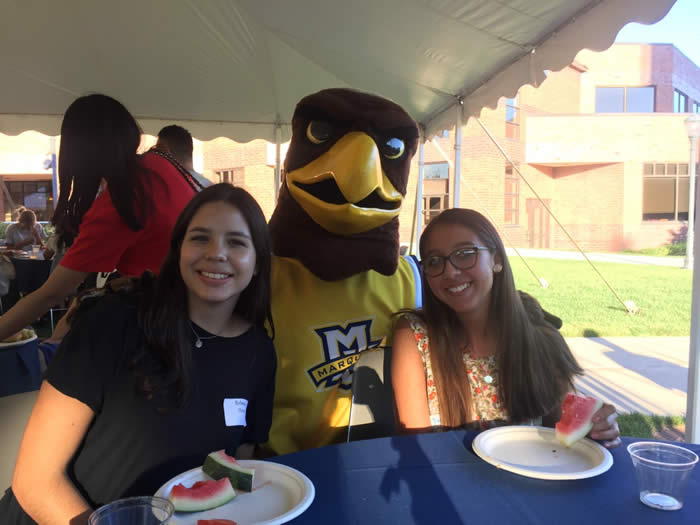 |
International student, Daniela Caceres, from Tegucigalpa, Honduras, is a freshman in the College of Business. |
Name: Daniela Caceres
Year in School: Freshman
Hometown: Tegucigalpa, Honduras
Major: International Business
Can you describe your hometown?
The first word that pops into my head when I think about Tegucigalpa is fun. I cannot recall any moment in which I was not having fun with my friends back home. Tegucigalpa is the capital city of Honduras, but unlike other capital cities around the world, Tegucigalpa (or Tegus as we call it) is relatively small. The nice thing about its size is that eventually everyone ends up knowing each other. Every time I go out, I run into friends or someone I know. I have really good memories from living in my hometown. People are really welcoming and energetic, and even though Tegus is not near the beach like most other cities in Honduras, people just make Tegucigalpa the fun and amazing place it is.
Why did you choose Marquette?
I chose Marquette because of what it has to offer. It has an amazing reputation, the education is one of the best in the country, and the community is a unique one. I also liked the fact that the university was located in a city that is not overwhelmingly big.These are just some of the things I thought about when choosing Marquette, and I have to say my expectations have not only been met; they have been surpassed.
How has your adjustment to Milwaukee been? What has helped?
Adjusting to Milwaukee was easier than I expected. I think that what has helped the process is that people around here are always nice and willing to help and so I have never felt as though I was alone. Also, having friends from other countries has been nice too because we provide each other support whenever we need it.
How would you describe your time at Marquette?
Marquette has been a roller coaster of emotions. It has not always been easy. There are times when I miss my country and my friends, and there are times when I feel like I could fail my classes (it has never happened!), but the nice moments I have been lucky to share with other people here, far outweighed the bad ones. I have found so much satisfaction in being able to pull through even when I least thought I would, and I have found happiness along the way. Continue reading.
Study abroad deadline: March 1
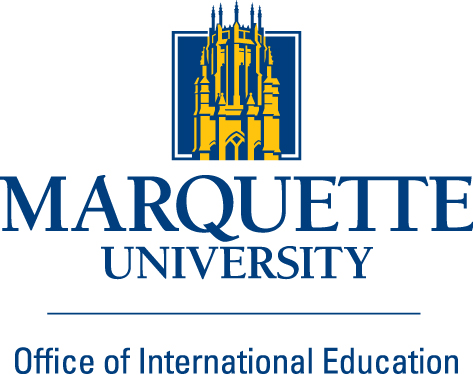
|
Apply by March 1, 2017 to study abroad this summer, fall and academic year! |
The deadline to submit Study Abroad applications for summer, fall and year long programs is fast approaching.
Whether you choose to study business for a year in Paris, France, or learn about literature, culture and the history of Ireland on a summer faculty-led program, there is a program fit for everyone. New Faculty-led study abroad programs include; Gender, Sexualities and Culture in South Africa in Cape Town, South Africa, International Perspectives in Sport Sciences in Berlin, Germany and West African History and Culture in Accra and Ashanti, Ghana. Interested students should to first attend an Abroad 101 session.
Visit the study abroad website to view the full list of programs and to apply.
Applications are open for the Student Ambassador program at World Expo 2017

|
The Eurasia Foundation, the University of Wisconsin-Madison, and the American Councils for International Education are partnering to facilitate the USA Pavilion Student Ambassadorship program at Expo 2017 (World's Fair) in Astana, Kazakhstan. |
Student Ambassadors are young people who will serve in a number of capacities to host the hundreds of thousands of guests who are expected to visit the Pavilion and to interact with the millions of guests who will attend the Expo. This opportunity is open to all undergraduate or graduate students who are US citizens or US permanent residents, who are enrolled in any US college, university or other academic, educational or diplomatic programs, along with recent graduates. The deadline for submission is 15 March 2017 (11:59 pm PST). For more information, visit the website.